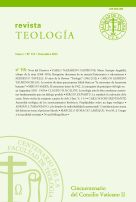Please use this identifier to cite or link to this item:
https://repositorio.uca.edu.ar/handle/123456789/7185| Título: | La Trinidad y la salvación de la carne : breve visión de conjunto a partir de Adv. Haer. V,1-14 Trinity and salvation of the flesh : brief overview based on Adv. Haer. V,1-14 |
Autor: | Zañartu, Sergio, S.I. | Palabras clave: | TRINIDAD; SALVACION; HEREJIAS; HISTORIA DE LA IGLESIA; ESPIRITU; Ireneo, Santo, ob. de Lyon, siglo II | Fecha de publicación: | 2014 | Editorial: | Universidad Católica Argentina. Facultad de Teología | Cita: | ZAÑARTU, Sergio., La Trinidad y la salvación de la carne : breve visión de conjunto a partir de Adv. Haer. V,1-14 [en línea]. Teología, 115 (2014). Disponible en: https://repositorio.uca.edu.ar/handle/123456789/7185 | Resumen: | Resumen: El autor nos ofrece en forma sintética el resultado de una larga investigación sobre la salvación de la carne en Ireneo, Adv. Haer. V, 1-14. Contra los herejes, para quienes la carne no tiene ninguna salvación, Ireneo afirma que ésta es salvada por el Espíritu. El hombre es fundamentalmente cuerpo, plasma, creado a imagen y semejanza, por las dos manos de Dios: el Hijo y el Espíritu. Y ambas manos lo salvan. Central es la Encarnación recapituladora, que, a través de la pasión liberadora, culmina en resurrección. La salvación del hombre es progresiva: la carne y el Espíritu mutuamente se van acostumbrando, hasta que la carne, conformada al cuerpo glorioso de Cristo recibe la incorruptibilidad por la visión del Padre. La cita de 1 Co 15, 50 se refiere a los carnales y no a la carne en sí. El trabajo es introducido con algunas citas trinitarias de otras partes de la obra de Ireneo, para enmarcar un poco el tema. Abstract: The author offers us a summary of the results of a long research about the salvation of the flesh in Irenaeus, Adv. Haer. V,1-14. Against heretics, for whom the flesh has no salvation, Irenaeus affirms that it is saved by the Spirit. Man is fundamentally body, created in the image and likeness of God, by both hands of God: the Son and the Spirit. And both hands save him. Central to this is the recapitulating Encarnation, which, though the liberating passion, culminates in resurrection. The salvation of man is progressive: flesh and Spirit get used to each other, until the flesh, conformed to the glorious body of Christ, receives the incorruptibility through the vision of the Father. The quotation of 1 Co 15,50 is referred to those who are carnal and not to the flesh itself. The work is introduced by some trinitarian quotes of other parts of the work of Irenaeus, in order to better contextualize the theme. |
URI: | https://repositorio.uca.edu.ar/handle/123456789/7185 | ISSN: | 0328-1396 | Disciplina: | TEOLOGIA | Derechos: | Acceso Abierto | Fuente: | Teología, Tomo LI, nº 115, 2014 ISSN 0328-1396 |
| Appears in Collections: | TEO - 2014 Tomo LI nro. 115 |
Files in This Item:
| File | Description | Size | Format | |
|---|---|---|---|---|
| trinidad-salvacion-carne-breve-vision.pdf | 276,5 kB | Adobe PDF |  View/Open |
Page view(s)
231
checked on Apr 30, 2024
Download(s)
227
checked on Apr 30, 2024
Google ScholarTM
Check
This item is licensed under a Creative Commons License

